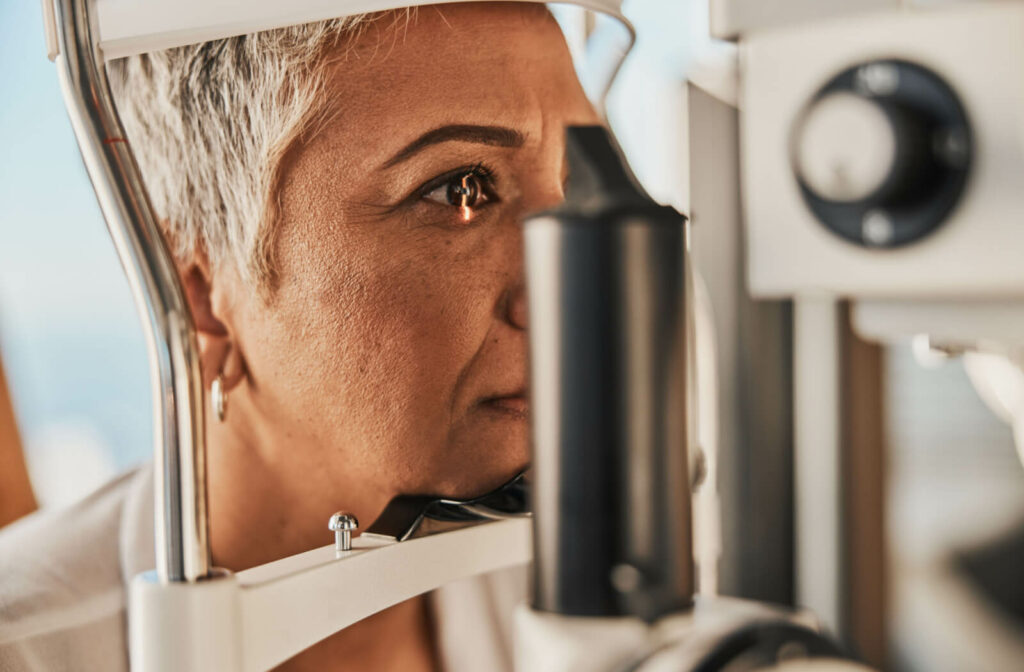Is Your Vision Getting Worse?
It’s not uncommon for vision to gradually change over time. Whether it’s squinting at the fine print or struggling to see the street sign, you might wonder why your eyesight is getting worse.
Several causes of worsening eyesight can include:
- Age-related changes
- Genetics
- Digital eye strain
- Medical conditions
- Lifestyle factors
An eye exam with your eye doctor can help determine the underlying reason for your worsening eyesight.
Reasons for Deteriorating Eyesight
Age-Related Changes
The most common reason behind worsening eyesight is unavoidable aging. As we age, changes to the eyes and vision can include:
- The eye lens becomes less flexible
- Difficulty focusing on close objects
- Trouble distinguishing colors
- Difficulty adjusting to changing levels of light
Presbyopia is a prevalent vision condition that typically becomes noticeable around age 45. This age-related issue arises as the natural lens in the eye gradually loses its flexibility, making it challenging for the eyes to focus on close objects.
People with presbyopia often squint while reading or holding reading materials at arm’s length to attain a clearer view. With worsening presbyopia, regular eye exams are crucial for appropriate adjustments to visual aids, such as reading glasses or prescribed lenses, and overall eye health monitoring.
Genetics & Family History
Sometimes, the answers to our health questions lie in our family trees. If one or both parents have a refractive error, there’s a chance that genetics could be a contributing factor to your worsening eyesight. Refractive errors like myopia (nearsightedness), hyperopia (farsightedness), or astigmatism can have a genetic component.
Digital Eye Strain
In this digital age, our eyes are exposed to more screen time, whether from smartphones, computers, or tablets. While technology has made our lives more convenient in many ways, it can also be hard on our eyes. Prolonged screen time can lead to digital eye strain and associated symptoms like headaches, blurred vision, watery eyes, and dry eyes.
Medical Conditions & Eye Diseases
Several medical conditions can contribute to worsening eyesight, showing the interconnected nature of eye health with overall health. Diabetes, for example, poses a significant risk to vision.
Diabetes can lead to diabetic retinopathy, a condition where high blood sugar damages blood vessels in the retina (the light-sensitive tissue at the back of the eye), potentially causing vision loss. Hypertension or high blood pressure can also impact the delicate blood vessels in the eyes, leading to hypertensive retinopathy.
Eye diseases such as glaucoma, often associated with increased intraocular pressure, can damage the optic nerve, resulting in peripheral vision loss. Cataracts are a common eye disease in older adults that results in the clouding of the eye’s lens and symptoms of worsening vision such as blurry vision, faded colors, poor night vision, and frequent prescription changes.
Lifestyle Factors
Certain lifestyle factors can contribute to worsening vision, such as the following:
- Smoking can lead to an increased risk of macular degeneration and cataracts.
- Prolonged exposure to UV can lead to cataracts and worsening eyesight.
- Nutritional deficiencies can impact eye health negatively and result in vision impairment.
Why Is My Eyesight Getting Worse Even with Glasses
If you wear glasses or contact lenses but notice your vision getting worse, it may be time for a prescription update. Changes to your prescription can happen throughout your life.
For most people with myopia, prescription changes typically slow down or stabilize in their early to mid-20s, once the eyes have fully developed. However, you may continue experiencing gradual changes beyond this age, especially if they engage in excessive near work, prolonged screen use, or have conditions like progressive myopia.
Age-related vision changes, like presbyopia, usually begin in the early 40s and continue to progress until around the mid-60s.
Eye conditions like cataracts or macular degeneration can lead to further vision deterioration later in life. This is why regular eye exams can help monitor and manage these changes throughout your life.
How To Protect Your Vision
While we can’t halt time or reverse certain conditions, there are measures you can take to maintain healthy eyes and prevent vision loss.
Eye Exams
Regular comprehensive eye exams allow your eye doctor to look at the back of the eye for signs of common eye diseases before they worsen and affect your vision. If you have diabetes, regular diabetic eye exams can check for signs of diabetic eye disease before they cause damage.
Know Your Family History
While you can’t change your genetic makeup, knowing your family history allows you to take proactive measures. If you have a higher risk of developing eye conditions, regular eye exams become even more crucial in monitoring and addressing potential issues early on.
Lifestyle Changes
Lifestyle adjustments, such as the following, can help protect your vision:
- Maintain a healthy diet rich in antioxidants to support eye health.
- Wear sunglasses to protect against UV exposure.
- Combat digital eye strain with the 20-20-20 rule: every 20 minutes, take a 20-second break, and look at something 20 feet away.
- Attend regular eye exams to recieve timely diagnosis and management of underlying medical conditions such as high blood sugar and high blood pressure.
- Quit smoking to reduce your risk of developing sight-threatening eye diseases.

Preserve Your Eyesight
Many different factors can contribute to worsening eyesight, from genetics to poor nutrition and digital eye strain. While some of these factors may be outside of your control, there are several things you can do to protect your eyes and preserve your vision.
If you’re at an increased risk of eye disease or notice changes to your vision, book an appointment with Fort Myers Eye Associates for an eye assessment and early treatment specific to your needs.





